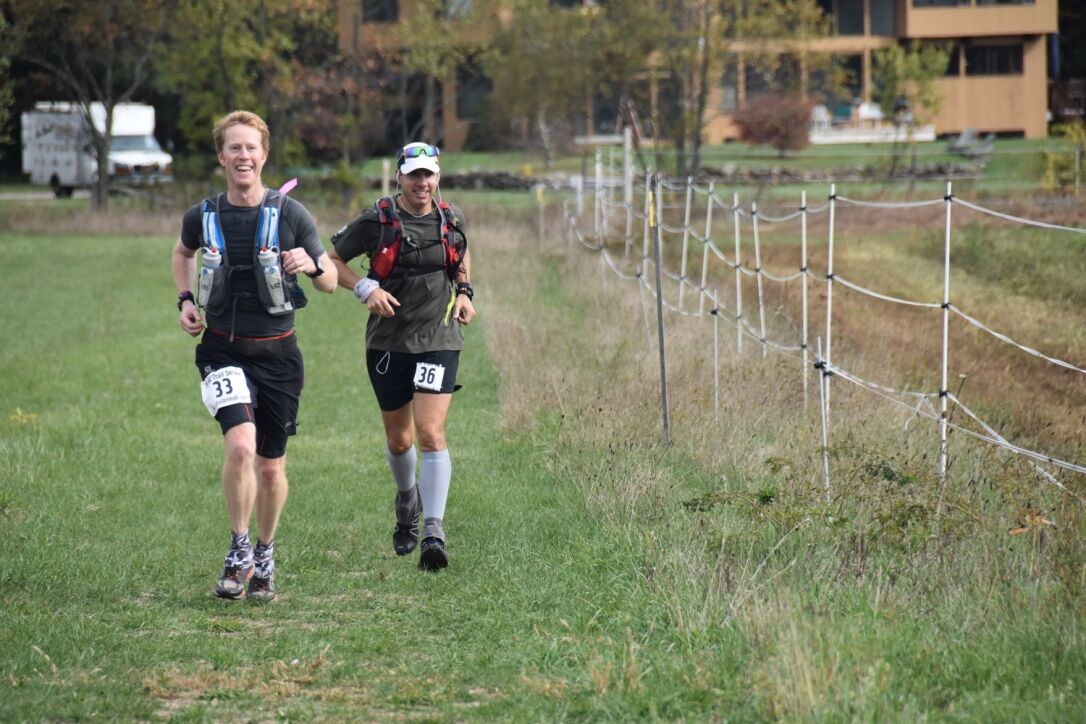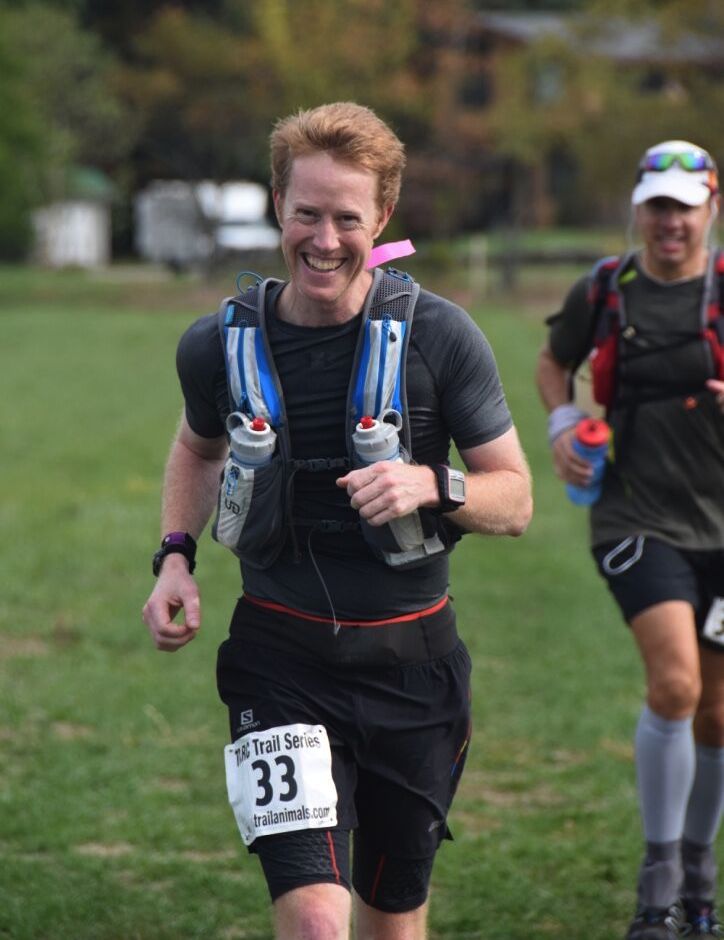
In his 40s, and after just 8 years of running experience, Brendan Frank finished the TARC 100, a 100-mile trail run in Westwood, MA. Read on to discover how he got into running, what he did to prepare, and how he fared on race day.
Brendan Frank, a native of Washington, DC, is a father and works in financial services. He graduated from the University of New York at Albany before settling in a suburb of Boston—though settling doesn’t mean he’s not active! Last month Brendan completed a 100-mile trail race in just under 28 hours. The race, which was hosted by TARC (Trail Animals Running Club), took place on October 8 on the Hale Reservation in Westwood, Massachusetts. It consisted of a 25-mile loop done four times, 99.9% of which was run on trails.
After his successful completion of the TARC 100, Brendan was kind enough to answer a few questions about his experience.
Interview with Brendan Frank

How did you become involved with TARC and why was this past race “the last TARC 100?”
I was introduced to TARC by a close friend and former colleague who got me interested in trail running.
When I first met him in ’02, we shared an office, and I found out that he was an avid runner. He had run a few marathons by that point, and I was always curious, asking him about his training, why he did it, and what he liked about it. He had just welcomed twin daughters around that time, and my daughter was born a year later. Although we left that company, we stayed in touch.
In 2010, on kind of a dare, I decided to run the Hartford Marathon. My friend (mentioned above), Jim, was very supportive and helped answer all those “first-timer” questions. By that point he had been running trails and was starting to get into longer distances, or Ultramarathons (an “ultramarathon” is anything longer than 26.2 miles). In 2014 I ran my first trail race, a 12k, and was hooked. Within a week I signed up for a 50k and then a 50 miler.
This past TARC 100 was the last due to the organization agreeing to take over another 100 miler.
Based on results posted on Ultra Signup, you finished the race in 27 hours, 55 minutes and 57 seconds. How did you manage? Did you even stop to sleep?
The short answer is I just kept moving forward, running when I could and walking when I had to.
I did not stop to sleep and went into the race telling myself that that wasn’t even an option. There was a 32-hour cut-off and I didn’t want to find myself with miles to go as the final hours/minutes were ticking down.
Having run a couple of 50 milers before, I knew that I was capable of at least that distance and used my finishing times from those races as kind of a general guide for what my initial and final pace might be like. I figured if I could get through 50 miles in or around 12 hours, I’d have 20 hours left. Barring any serious injury, cramps, stomach issues, fatigue, etc., that seemed like it could be enough time to complete the race.
Two weeks before the race, I started trying to break down the 100 miles into something much more manageable. Visualizing the race in distinct segments helped a lot: each lap being 25 miles, each 25 miles broken into smaller sections (aid stations approximately every 5-6 miles). From there, it became easier to focus on just reaching the “next goal,” whatever it happened to be.
I also enlisted the help of a “pacer,” a good friend and solid trail runner, whose job it was to just keep me on track. She ran with me for about 16 miles during the end of my third loop and the start of my fourth and final lap.
I cannot say enough good things about the volunteers who manned the aid stations throughout the race. Many of them are extremely accomplished Ultrarunners in their own right, devotees of the sport, and all around wonderful people. They seemed to know exactly the right thing to say to keep me in a positive mind-set and made sure that I was eating and drinking consistently. There’s something magical about coming to an aid station in the middle of nowhere, at 2:30 in the morning, exhausted and filthy, and finding smiling faces offering food and drink.
How did you prepare for the race?
I read as many race reports from past years as I could. Earlier in the summer I was running in VT with someone who mentioned they had finished the TARC 100 last year. I peppered him with questions; what he ate, what gear was crucial, how he got through the night, what type of pace he ran. He was one of the volunteers at the start/finish and just knowing he was there was a mental boost.
TARC also published a fantastic guide to the race that has one of the most vivid course descriptions imaginable. I must have read it at least a dozen times leading up to the race.
I’m kind of compulsive when it comes to planning and organizing, a trait that’s very helpful in this type of situation. I organized three “drop bags” for the race; one for the start/finish, another for the Grossman Beach aid station, and the third for the Powisset Farm aid station. Basic medical items, dry socks, dry shirt, etc. Knowing those items are close by is a big psychological boost.
Is it difficult to juggle training, racing and family time?
At times … I’ve had to be creative with how and when I train. Because of my custody schedule, I have every other weekend without too many family obligations, so fitting in a five or six-hour training run isn’t too much of an imposition. During the week it’s a bit harder to find time for longer runs, but going out after work with my dog for even five miles is a great stress relief.
When my daughter was younger, I would limit my running to very early mornings, before anyone else was awake. I didn’t want it to interfere with my responsibilities.
Have you always been an athlete or was the Trail Animals Running Club something you signed up for out of the blue?
I wasn’t very athletic as a child and really disliked running. Let me say that again, I REALLY disliked running. As a child, I wasn’t fast, couldn’t ever seem to catch my breath, and just didn’t see the point.
Although I played sports in high school (swim team, diving team, soccer) I always felt uncoordinated. By the time I got to college, I didn’t have many athletic pursuits aside from skiing or occasionally mountain biking.
It took me until my late 30’s to find that I could actually enjoy running, and then a few more years to realize that I had a modest amount of stamina and could run for a decent amount of time. In 2011 I read a book called Born to Run, by Christopher McDougall, and it changed my entire outlook on running. I’ve since reread it several times and have given it to a number of people new to the sport.
What is your favorite part about long distance trail races?
I absolutely love being outdoors, regardless of the weather, so any time I get a chance to be outside is a real gift. Witnessing the sunrise and running until it sets is pretty amazing. No traffic, no billboards, no emails, rarely any phone calls…it’s rejuvenating to unplug and unwind.
Meeting people on the trails and chatting about life is fantastic, as is being able to help other runners along the way. There’s a wonderful sense of comradery in the sport.
TARC and the trail running community at large is hands down one of the nicest groups of people you will ever meet. Regardless of ability, body-type, age, or nationality, they are incredibly supportive and welcoming.
There’s always a challenge to overcome, always something new to learn about myself, and I can’t think of too many better ways to stay healthy and engaged in the world around me.
What was your biggest challenge during the race?
There were a few moments during the final lap when the drizzle had turned to rain and I caught myself thinking about how much longer I had to go. Everything felt tired and there are those questions that loom pretty large at times like that: “do I feel like I can keep going? What if I just stop, right here, right now?” Then I realized that the sun would be coming up in an hour or two, I could put on dry socks at the next aid station, there would be someone to talk to, and last but not least, I thought about my daughter, Marlo. I thought about her and being able to say I did it, “Dad finished the race.” That’s more motivation than I needed.
Now that you’ve completed such a long race, do you have any future running goals?
Absolutely! I’m so new to this that there is a lot to learn. I only started running eight years ago but meeting runners in their 60’s and 70’s who are still running strong makes me very optimistic about the miles ahead.
I just ran a PR (personal record) this past weekend at the StoneCat 50 Miler, breaking 10 hours (please keep in mind, 10 hours is not fast by some standards but it is for me!). I would love to get into the Vermont 100 when registration opens in January, and then there is a trail in the White Mountains, the “Pemi Loop,” which I’d love to run in a day. It’s a lot of elevation gain/loss and is about 34 miles.
Then there are the big ones: Western States, Leadville, Badwater … maybe someday? I hope so!
I also want to volunteer at several races next year. These races take a lot to organize and manage and I love the idea of being able to give back to the sport and community.
****
Looking for more runspiration? Check out Rachel Chang’s first marathon experience.


